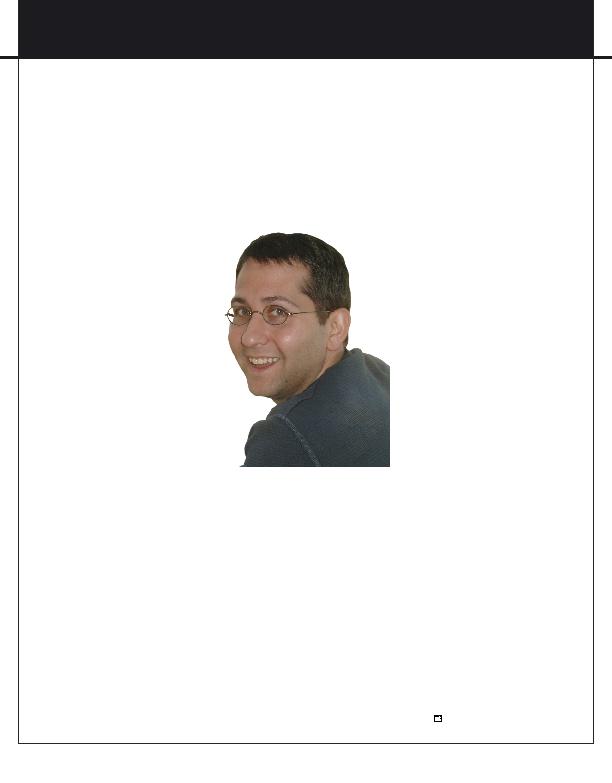
14
|
creativescreenwriting May/June 2010
AS AN EDITOR
at Us Weekly, David
Guggenheim was used to writing articles
about celebrities. Now articles are being
written about him. By anyone's standards,
2010 is shaping up to be a phenomenal
year for the screenwriter. Not only is he a
new father but he also sold a spec script
(Safe House) and a pitch (Puzzle Palace),
both in heated bidding wars, within an
eight-week period.
Despite press that implies Guggenheim
is a novice screenwriter, the truth is that he
is a graduate of New York University's Tisch
School of the Arts Dramatic Writing Pro-
gram. In addition, Guggenheim's first spec
went out when he was only 19. It made the
rounds and looked like it was going to sell,
but Guggenheim met disappointment in
the end. Another near-miss sale landed him
an agent who eventually introduced him to
his current manager.
Though he was based in New York,
Guggenheim knew that moving to Califor-
nia might improve his chances of securing
work. But even with two older brothers,
both industry-based writers, encouraging
him to make the move, Guggenheim re-
mained reticent and instead took a job at
Us Weekly. "I didn't have the courage [to
move to LA] that other people have," he
admits. "I needed a little more security, so
I decided I'd write from here."
Guggenheim continued to pen scripts
that garnered attention but, for one reason
or another, did not get produced. In retro-
spect, he says, he knows why those scripts
didn't sell and applied what he learned
from those "failures" when creating the
script for Safe House.
Written on a self-imposed deadline (a
baby on the way) in the fall of 2009, Safe
House tells the story of the only surviving
agent of an attack on a South American CIA
safe house. The agent must find a way to
transport a dangerous prisoner to a second
safe house while the two are pursued by
forces that want them both dead.
A self-professed lover of espionage films
(he thinks James Bond is the ultimate fran-
chise), Guggenheim had been developing
the safe house idea for a while.
"We've heard about safe houses. We've
seen a scene that takes place in a safe house
so [I thought], `Why don't I just make this
a starting-off point?' I loved the idea of tak-
ing this sanctuary and [making it] the least
safe place to be," Guggenheim says. And of
the fairly unique Brazilian setting, he says,
"Spy movies usually are set in Europe so
that's already been done. South America is
like the Wild West. That's where there's a
lot of CIA involvement, so that seemed like
the perfect place to set the story."
The script really came together for the
writer when he married the safe house con-
cept with the idea of "these two guys at the
opposite end of the spectrum -- the vet
and the freshman, the idealist and the
cynic -- and had them play off each other."
Preferring to write a first draft as
quickly as possible, Guggenheim outlines
the first act and has to know what the
third act is before starting. In the middle
he likes to explore.
"Sometimes it gets me into trouble and
sometimes it doesn't. That's the fun of it,
though. You're discovering these story ele-
ments that you didn't think existed."
Given his full-time day job, Guggen-
heim wrote mostly at night after his wife
went to bed. He finished the first pass of
Safe House in a month, worked on revi-
sions to produce the draft that sold in
three months.
Reeling from the six-figure sale of his
first script, Guggenheim immediately
began a round of pitch meetings. Never
having pitched a film before, Guggenheim
drew on his editorial experience at the
magazine, where he has to pitch four or
five story ideas a week.
The preparation served him well and led
to a second six-figure sale of his next proj-
ect, Puzzle Palace. A teen thriller, Puzzle
Palace is the story of a young man trapped
in a police station who resorts to stealing
evidence in order to escape from a band of
crooked cops.
And as if life couldn't get any better, a
spec that Guggenheim wrote a few years
ago, Medallion, is also garnering interest
and has a producer attached. "It's surreal,"
Guggenheim admits.
So with his screenwriting career kicked
into high gear and a new baby daughter
in tow, what's next for Guggenheim?
Perhaps the elusive move to LA? Not
necessarily: "You have to make yourself
available to go out there to meet with
everybody. But I'm proof you can write
from anywhere. Besides, I love New
York."
PE
O
PLE
v
BY
S H A R I C A R P E N T E R
Magazine editor scores with not one,
but two, spec sales.
David Guggenheim

